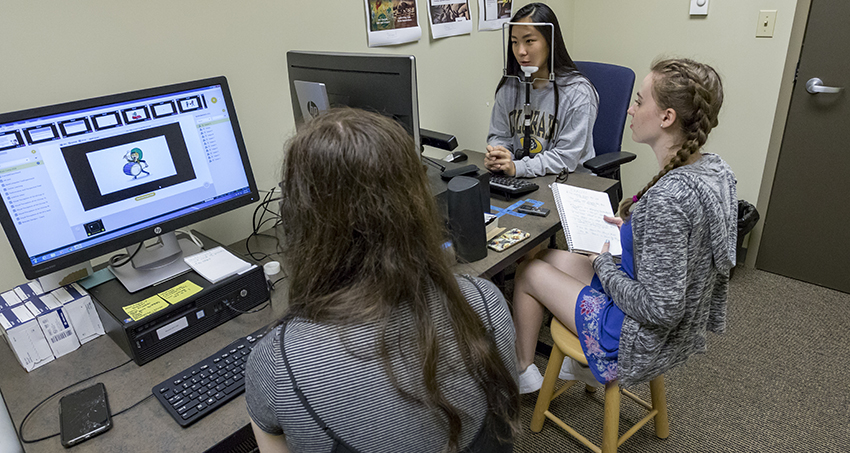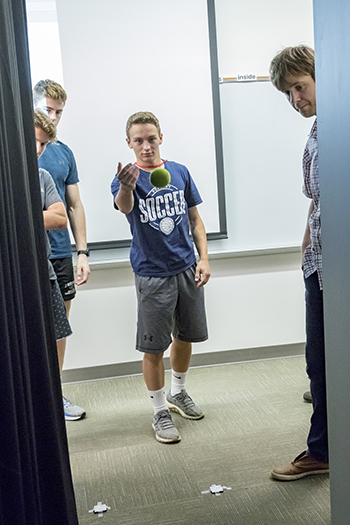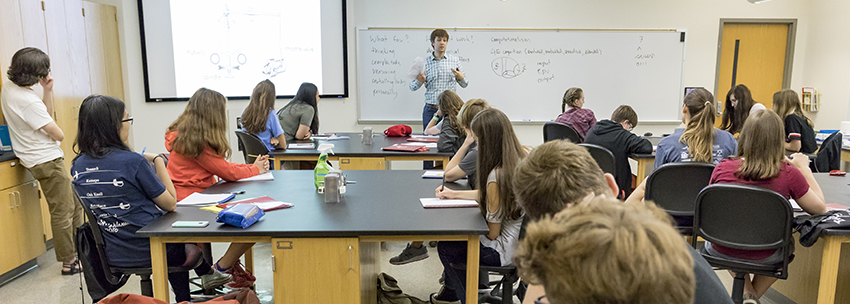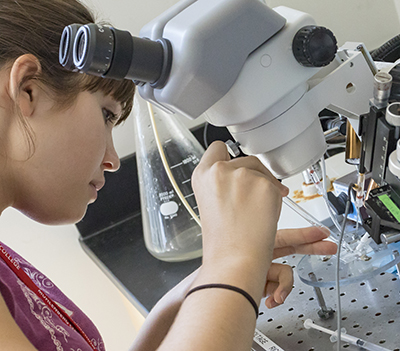Bonding Over the Brain
Muhlenberg’s neuroscience faculty members host a fully-funded “summer camp for nerds” for rising high-school seniors from around the world.By: Meghan Kita Friday, August 3, 2018 01:29 AM
 Brain Campers conduct a linguistics experiment using an eye-tracker. Photos by Paul Pearson.
Brain Campers conduct a linguistics experiment using an eye-tracker. Photos by Paul Pearson.
“A woman is crushed by a weight.” “A girl had an anvil dropped on her and she’s laughing.” “There’s a girl getting crushed by the weight of a dumbbell.”
The first three participants in this experiment form three different sentences to describe the same image (a Bitmoji illustration—no humans were harmed in the course of this research). And yet, all their descriptions have something in common: the use of the passive voice.
This week—the third week in July—assistant professor of psychology Alexandra Frazer is overseeing linguistic research conducted by three of the 24 high-school students at Muhlenberg for Brain Camp, which Stanley Road Professor of Neuroscience and department chair Jeremy Teissere refers to as “summer camp for nerds.” This particular project certainly appeals to grammar nerds: Using an eye tracker and a selection of Bitmojis, the students are exploring whether a participant’s choice of sentence structure can be influenced by which part of an image they’re cued to look at first.
But Brain Camp has something for all kinds of nerds: The other students are working in teams in the labs of seven other faculty members, investigating topics as varied as how stress affects hand-eye coordination (pictured), how social media affects alertness and how an essential oil affects certain receptors in the brain.
The goal is to contribute new knowledge to the field of neuroscience, Teissere says: “They’re not just coming to work in the lab for the week. Ideally, they are conducting the science themselves, with a safety net of mentorship around them.”
What Is Brain Camp?
In addition to the afternoon lab sessions, the rising high-school seniors at Brain Camp enjoy daily morning discussions on neuroscience-related topics and evening social activities. The week culminates with a Friday poster session at which the students present their research to each other, their families and members of the Muhlenberg community. The camp, which first ran in the summer of 2004, has been fully funded by the Sentience Foundation since 2008.
“Given that Brain Camp is totally free, except travel, we are particularly pleased that we get a diverse selection of campers—by race, by school-district funding, by gender, sometimes soon-to-be first-generation college students,” Teissere says.
About 75 to 100 students apply to Brain Camp annually; this year, the selected group included students from Florida, Minnesota and Poland. Though Brain Camp is not meant to be a recruiting tool for the College, Muhlenberg is one of only three liberal arts colleges in the United States in which neuroscience is a stand-alone department, and about a quarter of each year’s campers go on to apply here. Usually, one or two choose to attend; one year, four Brain Campers were in a class of first-year students.
The program’s current format has been honed through more than 10 years of feedback.
“Students have often said the theoretical morning discussions excite them because that’s what they imagine would happen in college, because they’ve never had the chance to talk about theory in high school,” Teissere says. “And they have big questions, like what is a person and what is consciousness, that they want to talk about. That’s why we do it.”

While the benefits of the afternoon lab sessions are a bit more tangible—original research to add to one’s college applications—the students are also genuinely interested in the new-to-some-of-them experience.
“I’ve never done an experiment like this before,” says Chase Cohen, a camper from Staten Island, New York, who worked on the eye-tracking research in Frazer’s lab. “We had a lot of control and got to do a lot of it ourselves. This gave me hands-on research experience for the first time.”
The professors enjoy themselves, too: “It’s fun to do a project on a really short scale like this because you just have to go for it and fly by the seat of your pants,” Frazer says. “Plus, these are students who are really interested to learn more about research.”
Rave Reviews
At the end-of-week poster session in the Seegers Union Event Space, Teissere greets the students and their guests.
“We say at the beginning of Brain Camp that the goal is primarily to meet other nerds, nerd out, and produce a novel nerding-out contribution in neuroscience to the universe by the end of the week,” he says. “I am so impressed every year by the quality of the research.”
The students were also impressed, and not just by what they were able to discover in the lab.
 “I knew I’d meet some people from other places and get some cultural dialogue—I made friends with these guys the first day,” says Brendan Kern, a Brain Camper from Allentown, referring to the two other students he worked with in assistant professor of neuroscience Matthieu de Wit’s lab. “I don’t think I’ve ever spent this much time with someone and not been sick of them. I genuinely love these guys, and all the people here are great, smart kids.”
“I knew I’d meet some people from other places and get some cultural dialogue—I made friends with these guys the first day,” says Brendan Kern, a Brain Camper from Allentown, referring to the two other students he worked with in assistant professor of neuroscience Matthieu de Wit’s lab. “I don’t think I’ve ever spent this much time with someone and not been sick of them. I genuinely love these guys, and all the people here are great, smart kids.”
Madison Toonder (pictured), a Brain Camper from St. Augustine, Florida, praised Frazer’s lecture on what takes place in the brain when humans use curse words. “I come from a very scientific and chemistry- and biology-based background, but getting to learn about linguistics was super fun and I didn’t realize I would enjoy that so much,” says Madison, who hopes to become a marine animal veterinarian. “Having that experience and watching that lecture and talking to the professor made me realize a passion for something I’d never thought of before.”
